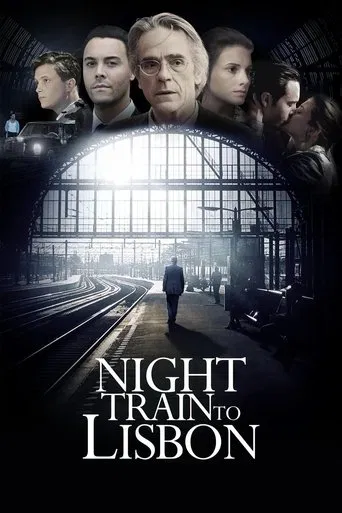

Slow pace in the most part of the movie.
... View MoreDon't Believe the Hype
... View MoreBetter Late Then Never
... View MoreBlistering performances.
... View MoreHis knack is to tell fascinating and important stories by subtle understatements. He has done it again and again. Here a solitary and somewhat aging teacher in Bern, Switzerland, finds himself suddenly in an awkward situation, when a girl obviously intends to jump off the bridge he is passing. He saves her life with consequences. She disappears as a perfect enigma but leaves behind a book containing poetry written by some Portuguese. The last class the teacher Jeremy Irons held in Bern was about Marcus Aurelius and his philosophy, and the book left behind is very much in the mood of the philosophic emperor, so much that Jeremy Irons gets obsessed by it and goes to Lisbon just to continue delving into more matter for the story he obviously has stumbled upon by accident.The film is throughout held at a very low key and pace but at the same time remains inescapaby intense, as a very complicated love story in the shadow of the revolution in Portugal 1974 unravels. Bille August is expert at poignant story telling, and this might be his best film so far. All the actors are wonderful and compliment each other marvellously, only Jeremy Irons always remaining the same, and Jack Huston as the poet, while all the others also are played by parallel actors 40 years earlier. The drama is told with perfect constraint all the way, nothing is dramatised, which only enhances the effect of a very human and naturally tragic drama of intricate relationships. Charlotte Rampling makes a strong appearance as the poet-doctor's sister, and also Christopher Lee, Tom Courtenay and Bruno Ganz show up to finally bring it all to a proper and very satisfactory conclusion with the irresistible Lena Olin. All the young actors are also perfect.In brief, this is a typical Bille August masterpiece to remember and see again once in a while, because it's a story you shouldn't forget, and it is told with totally convincing pregnancy.
... View Moreto define it as a provocative film is the first temptation. because it is one of films proposing more than a story. it is a trip across the recent history. it is exploration of roots of the evil and sacrifice. it is answer to delicate questions about contemporary world as result of the pressure of past. it is a love story with strange and impressive result. and, not the last, it is new occasion for Jeremy Irons to give an admirable role. at the first sigh, it is all. but , in fact, it is a personal experience. like the book. so, for each of his viewers, the answers , the verdict are inside of him.
... View MoreI am angry with at least six thousand of you who voted less than 7 (the minimum I normally have time to watch) and caused me delay in finding this wonderful film. Maybe I should submine the IMDb database so that I can cross-reference your votes on other films and generate my own ratings in a numberscape void of your numbscape. That said, I can now begin my review. It is often said that a film is usually inferior to the book on which it is based. And whereas this tendency is almost a de facto weakness, such films must be made at all costs, because films that are not based on any book tend on average to be worse. In this case, the skill of the original novelist explodes early on screen as the words of a fictitious novel that is central to the plot. There is an old joke, 'what is the difference between heaven and hell?' that compares the weaknesses and strengths of different European nationals. For example, in heaven the Italians are the lovers and the Swiss are the bankers and in hell the roles are reversed. Having lived in Switzerland, I have to disagree with such stereotypes. And indeed, this story does a good job in exploding such myths, for the central character is Swiss and while demonstrating a quiet, deferential manner, reveals increasingly the intense passion he feels as the story unfolds, as indeed it does for the viewer, who should I would hope empathise to some degree.It is almost a rule of novel-writing that a story be told in the words of its characters. Films rarely manage to include the unspoken words, but this masterpiece uses many clever tricks to work around that problem seamlessly, that is to say, without exposing the inner workings of the writer's kitchen.The story begins in Bern where a teacher on his way to school encounters a Portuguese woman about to kill herself and who has also dropped a book on the ground. And from there all the way to the end and actually beyond, the film jumps headfirst into the depths of mystery. The teacher (Irons) follows a trail of clues laid out in the book from Bern to Lisbon, unfolding a story from the past of romance and revolution underpinned by eloquent passages of philosophical thought. I say that instead of philosophy, because they are very different things. A philosopher is a person who seeks answers to questions about fundamental laws and the human condition, whereas philosophy is the bureaucracy of categorizing such answers without understanding them beyond a level too superficial to be called philosophical.Needless to say, it was the words of Amadeu, the fictional writer at the centre of this story that lifted me to such a philosophical level. I cannot recall watching a film quite like it!Of course it helps to have a superstar cast which also was not apparent from the IMDb header! One either has to read the whole cast list or watch the film to realise how many heavy hitters are hiding in there!
... View MoreDon't be put off by critics who thought "Night Train to Lisbon" was old-fashioned, too talky and lacking in tension, because there is something unique about this movie; by the end, it's quite an experience.Raimund Gregorius, played by Jeremy Irons in his slightly detached manner, is a teacher in Switzerland. When he saves the life of a woman, she disappears leaving behind a small book written by a man named Amadeu do Prado, and a train ticket to Lisbon. Raimund becomes intrigued by the insightful writings of Amadeu, who has since died. Admittedly, all this setting up of the story is pretty contrived, but the important thing in the plot was to get Raimund on that journey to discover more about Amadeu.He meets many people who knew Amadeu including his sister played by Charlotte Rampling, always an intriguing screen presence, she still seems to get plenty of roles with absolutely no loss of mystique. As Raimund delves deeper and deeper into the story of Amadeu, and his relationship with revolutionaries during the Salazar regime in Portugal, he becomes aware that much is missing from his own life.Amadeu's story is told through extensive flashbacks, with younger actors playing the parts of the older storytellers - maybe it's this element that some thought outmoded. Flashback was a technique beloved of film noir where we even had flashbacks within flashbacks. The structure of "Night Train to Lisbon" is not unlike 1944's "The Mask of Dimitrios". Although the plots are different, that old film was also about someone who becomes intrigued by the life of another man, mainly through the memories of others. I'm sure there are plenty of other examples.It wasn't until near the end that I realised "Night Train to Lisbon" had similarities not so much to old movies, but to a much older story: Raimund is inspired by the wisdom and profound sayings of a man who seemed better than other men, who spoke out against evil, became a healer and saves the life of a man whom he had every right to think of as an enemy. Finally, Raimund's journey has become more of a pilgrimage, and through the inspiration of Amadeu, he develops a more positive outlook on life.Although not exactly blinded on the road to Damascus, Raimund does seem to have an epiphany on the train to Lisbon. I don't know if the author of the novel, Pascal Mercier, intended such a religious parallel, but the script would have been too heavy-handed for any of the characters to have made that connection; it has power if the audience finds it for themselves.If a movie doesn't grab me, I can forget nearly everything about it by the next day, however I must admit this one has stayed with me. It's a film that gets you thinking.
... View More